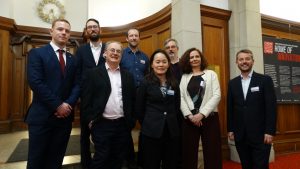A Vision for Clean Growth
21 January 2020
 ‘Throughout 2019, global events – from Australia’s bush fires to Delhi’s coldest day in over a century – heightened our focus on renewables and clean energy.
‘Throughout 2019, global events – from Australia’s bush fires to Delhi’s coldest day in over a century – heightened our focus on renewables and clean energy.
As Director of Cardiff Catalysis Institute (CCI), I’m acutely aware of unlocking the power of my own specialist science to deliver clean growth. In effect, that means applying catalysis to industrial processes – or translating research into real-world answers that bring benefits for all.
A catalyst increases the rate of a chemical reaction. Catalysis enables chemical reactions to go faster, with better selectivity and at a lower energy cost resulting in cleaner, more economical and more sustainable processes.
For those of us working in the field, the importance of the science is obvious. But the case for catalysis still needs to be made to a much wider audience.
Ask a policy maker, funder, entrepreneur or non-scientific academic about our work, and they may struggle to define or understand it.
A golden opportunity to put that right lies just ahead. In 2021, a new £80m Translational Research Facility (TRF) at Cardiff University will provide the tools we need to develop new catalytic processes with industry and promote the use of catalysis as a sustainable 21st century technology.
 Maximising the benefits of the TRF will help us expand our work. Our successes to date include replacing environmentally harmful mercury with a gold catalyst in industry processes; developing catalysts to reduce water waste by treating and recycling ‘greywater’ from showers, sinks and washing machines, and transforming waste products from agriculture, such as corn husks and stems, into useful chemicals and fuels.
Maximising the benefits of the TRF will help us expand our work. Our successes to date include replacing environmentally harmful mercury with a gold catalyst in industry processes; developing catalysts to reduce water waste by treating and recycling ‘greywater’ from showers, sinks and washing machines, and transforming waste products from agriculture, such as corn husks and stems, into useful chemicals and fuels.
Over the next five years, we will build on these formidable foundations, broadening our science based and engaging multidisciplinary researchers who bring complementary expertise and opportunities.
We have an outstanding reputation for heterogeneous catalysis. Our strategy is to maintain this position, whilst growing and developing capability in homogeneous and biological catalysis to the same international level.
Since 2014, the Institute has raised over £20m in research income across 93 grants (including £3m directly from industry) and published over 800 papers in international journals, including 16 in Science or Nature.
We aim to build our income, outputs, impact and influence by developing three broad priorities. First, by expanding our interdisciplinary collaboration – broadening the membership of the CCI to engage with and co-host multidisciplinary researchers who bring complementary expertise and opportunities.
We will engage with industry, not as sponsors but as partners, to co-create and deliver the benefits of our research. And we will continue to deliver impact through the core of scholarly science at the heart of our Institute, enshrining the value of both applied and purely academic catalytic science.
Our overarching aim is to combine translational research that tackles critical societal and industry challenges with world-class fundamental scientific endeavour. This strategy is the path to achieve this aim and will ensure the CCI remains at the vanguard of catalysis research.
 The seventh annual Cardiff Catalysis Institute conference this month featured six external speakers – four of them female – from international academic institutions and global companies.
The seventh annual Cardiff Catalysis Institute conference this month featured six external speakers – four of them female – from international academic institutions and global companies.
Broadening our scientific base, engaging with policy makers and funders, working with industry and appealing to next generation scientists are the pillars on which we might just build a cleaner, greener world.’
Professor Duncan Wass, CCI Director
The TRF was designed by HOK London Studio and is being constructed by Bouygues UK